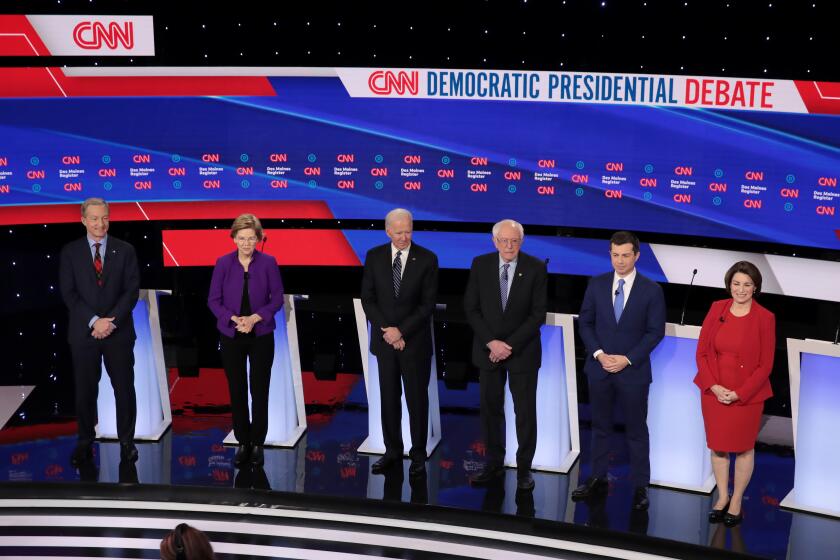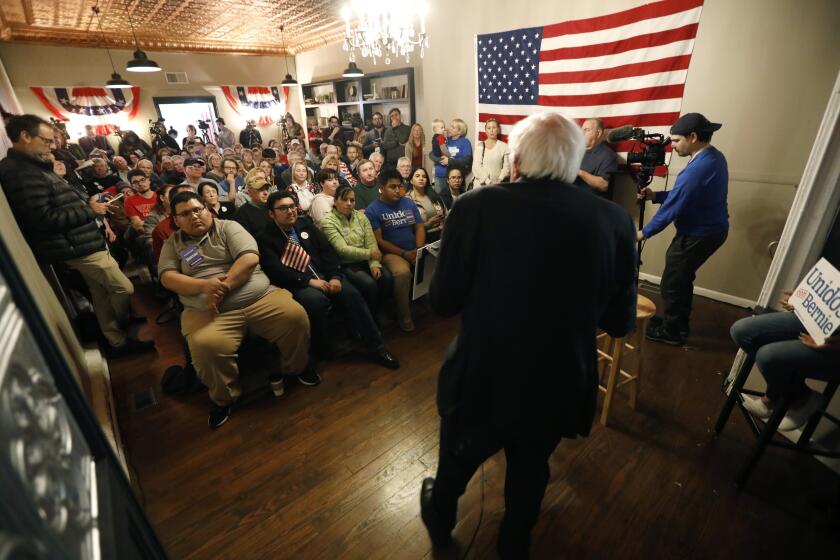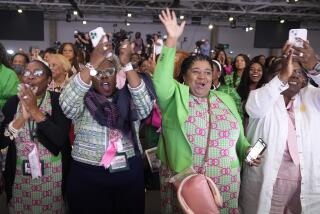Elizabeth Warren says Bernie Sanders told her a woman couldn’t win the presidency

Elizabeth Warren confronted Bernie Sanders face-to-face in Tuesday’s debate over her allegation that he told her privately that a woman could not be elected president.
- Share via
NEWTON, Iowa — Elizabeth Warren said Monday that a few weeks before the 2020 campaign started, Bernie Sanders told her that he did not believe a woman could win the presidency.
Warren’s politically charged comment came hours after Sanders adamantly denied an anonymously sourced CNN report that he’d made the remark during a December 2018 chat between the two senators at Warren’s Washington apartment.
“It is ludicrous to believe that at the same meeting where Elizabeth Warren told me she was going to run for president, I would tell her that a woman couldn’t win,” the Vermont senator said in a statement released by his campaign. “It’s sad that, three weeks before the Iowa caucus and a year after that private conversation, staff who weren’t in the room are lying about what happened.”
He added: “Do I believe a woman can win in 2020? Of course! After all Hillary Clinton beat Donald Trump by 3 million votes in 2016.”
But Warren issued a statement Monday evening that contradicted Sanders’ account of the conversation.
“Among the topics that came up was what would happen if Democrats nominated a female candidate. I thought a woman could win; he disagreed,” Warren said. “I have no interest in discussing this private meeting any further because Bernie and I have far more in common than our differences on punditry.”
Less than three weeks before Iowa begins the presidential balloting, six Democrats took to the stage for the first debate of the new year and the last before voters begin having their say.
The clash between the two leading left-wing candidates in the Democratic presidential race marked a definitive end to their longstanding agreement not to attack one another. It signaled the beginning of a more aggressive phase of the race, with multiple candidates struggling to keep their candidacies alive as voters narrow down their choices.
The back-and-forth came on the eve of the party’s final debate before the Feb. 3 Iowa caucuses, the opening contest of the campaign. Recent polls suggest it remains a wide-open race in Iowa, with Sanders, Warren, former Vice President Joe Biden and former South Bend, Ind., Mayor Pete Buttigieg vying for the lead.
The clash deepened as Warren and Sanders skittered around the Hawkeye State courting voters with plans to deal with the economy, tax the wealthy and extend Medicare to all Americans.
Sanders’ campaign was also accused of circulating talking points that said Warren does not bring in new voters because her supporters are affluent and already going to vote for a Democrat.
The Vermont senator said he was unaware of the script: “We have hundreds of employees, Elizabeth Warren has hundreds of employees, and people sometimes say things that they shouldn’t.”
Warren, meanwhile, said, “I was disappointed to hear that Bernie is sending his volunteers out to trash me.”
She recalled the hostility of many Sanders voters toward Hillary Clinton after he lost the 2016 race for the Democratic nomination to the former secretary of State. “We all saw the impact of the factionalism in 2016, and we can’t have a repeat of that,” Warren said. “Democrats need to unite our party.”
Party activists say they have less certainty about the outcome of the Democratic nominating process than at any time since 1992.
She’s not alone in worrying about another election in which primary rivals fail to coalesce behind the nominee.
“You both are progressive champs & our movement needs to see you working together to defeat your corporate Dem opponents — not attack each other,” Democracy for America tweeted on Monday, addressing Sanders and Warren. “Progressives will win in 2020, but only if we don’t let the corporate wing or Trump divide us.”
More than half of Sanders’ and Warren’s supporters told Quinnipiac pollsters that their second choice would be the other candidate, according to findings released Monday. And in Iowa over the weekend, the candidates were also trying to turn the heads of the state’s many uncommitted voters.
“I’m here to be frank with you, to ask for your support …,” Sanders told voters at an elementary school in Newton on Saturday. “Our campaign makes no bones about it — we’re here certainly to defeat Trump, but we’re here to do something more. We are here to transform this country and create a government and an economy that works for all of us, not just the 1%.”
Warren delivered a similar populist message to voters in Marshalltown on Sunday.
“This country is in a crisis and media pundits and Washington insiders and even a lot of people in our own party don’t want to admit it. They think that running a vague campaign that nibbles around the edges of these big problems is somehow a safe strategy,” she said. “They are wrong…. We win when we have big ideas that meet the problems in people’s lives.”
Sanders’ supporters argue that he is the most ideologically pure, pointing to Warren’s decision to transition into a fully government run, single-payer system over three years, first by expanding Obamacare and creating a public option before trying to pass Medicare for all through Congress.
Makenna Driscoll of Newton said Sanders has been “steadfast” in his support for Medicare for all and that Warren’s plan is watered down.
“Bernie has the best plan for my family,” said Driscoll, an IT staffer. “I’m a single mom. My parents have had to make choices between food and prescriptions. I want a future where I don’t have to worry about them.”
At a house party hosted by Warren’s campaign in Iowa City on Sunday, Jeff Cox kept a roll of Bernie Sanders stickers stashed in his pocket.
Cox said he believed Sanders and Warren had much in common, but said the Vermont senator “is just more committed on Medicare for all and free tuition.” The University of Iowa history professor supported Sanders in 2016 as well, but noted his side has “lost a lot of people to Warren” this time around.
Sanders has been performing well with younger voters, Cox said, but he worried that the complexity of the caucus process could deter them. Relying on turning out new caucusgoers may be a risky strategy, he said.
“The average self-propelled caucus attendee is a party loyalist, first of all. And they’re suspicious of Bernie,” said Cox, 72 “And they will turn themselves out ... they will come to the caucus. The people who are going to support Bernie have to be turned out.”
Warren’s backers counter that she is more electable.
“I don’t think we need any more old white men,” said Cynthia Schmidt, a retired school counselor from Garner. “I don’t want Grandpa Bernie, I don’t want Uncle Joe and I don’t want Cousin Pete. I’m ready for Aunt Elizabeth.”
Schmidt said plenty of Sanders supporters tried to sway her in the last campaign, but “his ideas are too pie-in-the-sky” for her and her husband.
“I believe Elizabeth is a pragmatist,” she said. “Very step-by-step. Yes, she’s goal-oriented but knows that there has to be steps to get there.”
Schmidt pointed to the senator’s signature plans: “As a former teacher and school counselor, I have to see a plan. ... that’s how women work,” she said.
Clarity Guerra, 32, of Iowa City, said she is drawn by Warren’s plethora of plans, her approach to shaking up the nation’s capital, and her gender.
“Part of why I want her as my president is because she is a woman and I know that companies that have women in their leadership are stronger companies and our country can be a stronger country with a woman at its helm,” said the university marketer. “But in addition to that ... I get the biggest sense from the Bernie supporters that it’s Bernie or nothing. And I find that the Warren campaign is one that will build a big coalition, and I want to stand with the big coalition that will win.”
Michael Fletcher, 67, of Grinnell, voted for Trump in 2016, and although he appreciates the president’s efforts on the economy and immigration, he said the president is too erratic to vote for again. He offered up his ideal Democratic ticket, a pairing that after Monday may have become even more unlikely.
“Who I’d love to vote for is Bernie Sanders with Elizabeth Warren as running mate,” said the retired window factory worker. “I think she’s a little bit further left than he is. But I think she would make a good president if he should have health problems and that’s still a concern of mine.”
Times staff writers Mehta and Mason reported from Iowa and Finnegan from Los Angeles.
More to Read
Get the L.A. Times Politics newsletter
Deeply reported insights into legislation, politics and policy from Sacramento, Washington and beyond. In your inbox twice per week.
You may occasionally receive promotional content from the Los Angeles Times.















